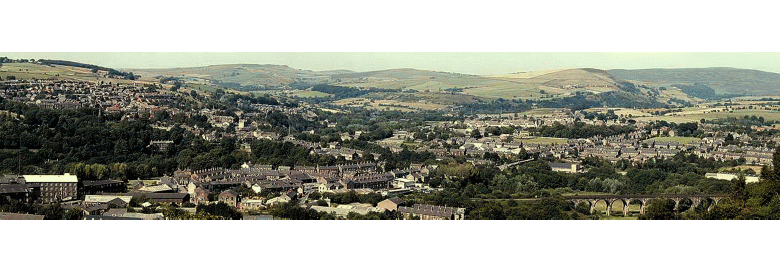Key
Name of Mill- (Also Known As) - Earliest Reference - First Known Owner- Produced
NEW MILLS
Salem Mill (Newmylne) (Bower Mill) 1390 - Richard Berd.
Originally a corn Mill. It is widely accepted that the town originated either because of this mill or around it.
Hyde Bank Mill (Beard Mill) 1767 – Thomas Beard - Woollen manufactuer.
Possibly began life as a corn mill.
Torr Top Mill (Barnes Top Shop) 1730 – John Barnes - Mentioned in the will of Thomas Bower. Originally a paper mill.
Torr Mill (Schofield Mill) 1804 – Joseph Randle – Cotton.
Rock Mill Printworks (Crowther Mill) 1794 - John Crowther – Cotton
Torr Vale Mill (Lowe’s Mill) 1788 – Daniel Stafford – Cotton.
Grove Mill (Barnes Mill) 1793 - Joseph Wyatt – Cotton.
St Georges Works (Wellington New Mill) 1824 – Potts Oliver and Potts – Pottery
Holehouse Mill 1796 - William Gaskell - Cotton Mill.
(Pre 1796 a leather Fulling Mill operated by William Gaskell)
1805 occupied by Philip Ashton – Cotton Manufacture.
Thomas Gaskell of Chapel en le Frith Cotton Manufacturer sold the property.
BIRCH VALE
Birch Vale Printworks 1823 – John Yates - Calico Printing
Garrison Works 1800 – James Nabb - Calico Printing
Bate Mill 1796 – James Bate – Cotton.
London Place (Watford Bridge Printworks) 1804 – Samuel Bridge, Robert Lang, James Hart - Calico Printing
ROWARTH
Top Mill 1800 – James Bolton – Cotton
Grove Mill 1822 – James Haigh & George Bowden – Cotton
Froggatt’s Mill 1784 – James Hadfield – Cotton
Lower Mill 1804 – James Hadfield – Cotton
Little Mill 1605 – Thomas Yeverley – Corn
Ringstones (Alma Mount) 1800 – John Bowden - Cotton
NEWTOWN
Brunswick Mill 1872 – Thomas Wood – Candlewick Spinner.
Victoria Mill 1860 – Joseph Froggatt -Candlewick Spinner.
Woodside Mill (New Brunswick Mill) 1872 – Joseph Clayton - Candlewick Spinner.
Albion Mill 1872 – J and E Dalton – Emery Works.
Warksmoor Mill 1850 – Robert Hibbert and Co. – Candlewick Manufacturers.
Redmoor Mill 1916 – James Edward Rowbottom and Co. – Cotton Doublers.
Albert Mill (Albert Bleachworks) 1872 – John W. A Turner – Bleachworks.
HAGUE BAR
Hague Bar Mill (Haigh Mill) 1828 – Joseph and John Stafford – Cotton Banding.
Strines Printworks (Strines Hall Printworks) 1792 – William Wright – Printing.
Ned Mill – located by the weir on a bend of the river at Goytside. The building here is historically referred to as Ned Mill, and appears in the census as such, though the property is more likely the waterman’s cottage lying as it does at the head of the leat. Perhaps a small-scale cottage production took place here in the dark past and some wit christened the cottage Ned’s Mill.
I have also seen reference to a Ned Mill in the Hague Bar area.
DISLEY
Woodend Printworks Pre 1793 – Benjamin and Samuel Gratrix – Printworks.
Waterside Mill 1804 – Messinger, Andrew & Paterson. Printworks.
Springwater Printworks (The Bone Mill) Pre 1833- Bone and Madder Mill.
HAYFIELD
Kinder Printworks 1840 – Thomas Hall and Joseph Higginbottom
Slack’s Paper Mill 1791 – John Slack – Paper
Wood Mill (Printworks) 1810 –Thomas Arnfield - Bleaching and Dyeing
Walk Mill –1800 – George Eyre – Wool
Upper Phoside Mill 1780s Aaron Rangeley – Cotton
Lower Phoside Mill 1780s Joseph Trevitt – Cotton
Entry Mill, 1851, Sam and William Howard - Wool.
Upper Bank Vale Mill – 1823
Hayfield Fulling Mill
Clough Mill – 1796 – Thornton and Ridgeway – Cotton
Primrose Vale Mill - 1842 - Robert Slack – Paper
Ned Mill (Grotto) – 1787 Joseph Bowden - Cotton
Swallow House Mill - 1819 - Cotton

FURNESS VALE
Furness Printworks – 1794 – Samuel Gratrix – Printworks.
CHARLESWORTH & CHISWORTH
Holehouse Mill - James Rowbottom - Cotton spinner and manufacturers
Chew Mill - String Works
Kinder Lee Mill- Charlesworth – Benjamin Harrison 'Thread and String
Lee Vale Rope Works - John Booth and Son - Rope
MELLOR
Mellor Mill - built by Samuel Oldknow between 1790-92. Largest mill in the area at 400 feet long and 6 stories high, destroyed by fire in the 1890s.
Holly Head Bleach Works - Cotton Mill in the 1790s became Bleachworks during the 1830s.
Holly Vale Mills - Built 1790, enlarged in 1850.
Ludworth Corn Mill- built as a corn mill, but later used for grinding bone meal.
Primrose Mill - built as a fulling mill in 1780, enlarged 1820s for yarn spinning. Burnt down 1961.
Spade Forge - early 1700s made metal goods such as spades.
Longshaw Clough Dam - owned by William Radcliffe.
Dove Bank Mills – destroyed by fire 1870s.
Brierleys Mill - Originally a Woollen Mill.
Cataract Mill
Old Mill Marple Bridge
Tin Plate Works
Clough Mill

 | 












